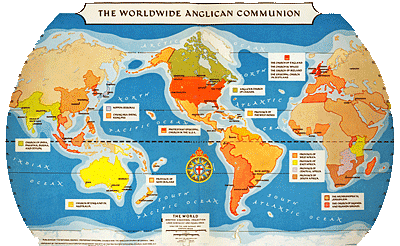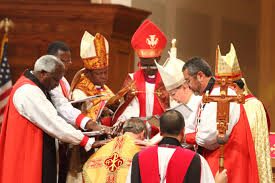The Anglican Communion
The Anglican Communion is a religious body of national, independent, and autonomous churches throughout the world that adheres to the teachings of Anglicanism and that evolved from the Church of England. The Anglican Communion is united by a common loyalty to the archbishop of Canterbury in England as its senior bishop and titular leader and by a general agreement with the doctrines and practices defined since the 16th century in The Book of Common Prayer.

.

Origins
The roots of the Anglican Communion can be traced to the Reformation in the 16th century, when King Henry VIII rejected the authority of the Roman Catholic pope in Rome and established an independent church in England. The essential teachings of the church were first set down in The Book of Common Prayer, compiled by Thomas Cranmer, and the organization of the Church of England was worked out during the 16th and 17th centuries. From the time of the Reformation, the Church of England followed explorers, traders, colonists, and missionaries into all parts of the world. The colonial churches generally exercised administrative autonomy within the historical and creedal context of the mother church. It was probably not until the first meeting of the Lambeth Conference (so called because it was held at Lambeth Palace, the archbishop of Canterbury’s residence in London) in 1867 that there emerged among the various churches and councils a mutual consciousness of an Anglican Communion. Since its inception the Lambeth Conference, which meets every 10 years, has constituted the principal cohesive factor in Anglicanism, even though its decisions are not binding and must be approved by the individual churches.
Beliefs and practices
The beliefs and practices of the Anglican Communion are often said to be the middle ground between those of the Roman Catholic and those of the Protestant churches. The Communion teaches a Trinitarian understanding of God and believes in Jesus as the coequal and coeternal Son of God who came for the salvation of humankind. The holy book of the Communion is the Bible, which is made up of the Old Testament, or Hebrew Bible, and the New Testament. Anglicans also accept the Nicene Creed and the Apostles’ Creed as essential statements of their beliefs. There are only two sacraments, baptism and the Eucharist, but the Communion honours confirmation, ordination, marriage, reconciliation of the penitent, and unction of the sick as important religious rites. Easter and Christmas are two of the most important holy days in the Communion, and members of the church attend weekly services. The Communion’s worship service varies but often includes the eucharistic rites, prayer, the singing of Psalms and hymns, readings from the Gospels and the Hebrew Bible, and a sermon by the presiding minister.
The Anglican Communion accepts a threefold order of ministry, including bishops, priests or presbyters, and deacons. The bishop is the chief administrative official of the church, and the highest figure of this rank is the archbishop of Canterbury. Priests, who may be men or women, are responsible for overseeing the local church, proclaiming the Gospel, blessing and pardoning in God’s name, and administering the sacraments. The function of the deacon is to assist the priest; deacons help to administer the sacraments and are also called upon to help spread the Gospel.
While population differences and other factors account for some variation in basic structure between the churches, several elements predominate. The diocese, under the authority of a bishop, is the basic administrative unit throughout the Communion. The diocese is made up of parishes, or local church communities, each under the care of a pastor. In many of the national churches, dioceses are grouped into provinces. In some, parishes may be grouped also below the diocesan level into rural deaneries and archdeaconries.
